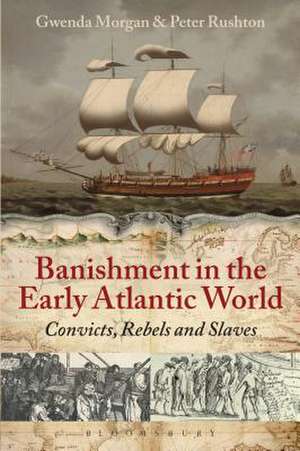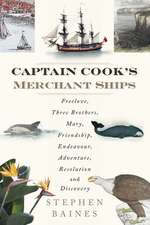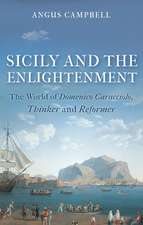Banishment in the Early Atlantic World: Convicts, Rebels and Slaves
Autor Peter Rushton, Dr Gwenda Morganen Limba Engleză Paperback – 19 iun 2013
| Toate formatele și edițiile | Preț | Express |
|---|---|---|
| Paperback (1) | 219.39 lei 6-8 săpt. | |
| Bloomsbury Publishing – 19 iun 2013 | 219.39 lei 6-8 săpt. | |
| Hardback (1) | 774.20 lei 6-8 săpt. | |
| Bloomsbury Publishing – 19 iun 2013 | 774.20 lei 6-8 săpt. |
Preț: 219.39 lei
Preț vechi: 275.77 lei
-20% Nou
Puncte Express: 329
Preț estimativ în valută:
41.99€ • 43.37$ • 34.94£
41.99€ • 43.37$ • 34.94£
Carte tipărită la comandă
Livrare economică 25 martie-08 aprilie
Preluare comenzi: 021 569.72.76
Specificații
ISBN-13: 9781441106544
ISBN-10: 1441106545
Pagini: 320
Ilustrații: 4 illus
Dimensiuni: 156 x 234 x 25 mm
Greutate: 0.43 kg
Editura: Bloomsbury Publishing
Colecția Bloomsbury Academic
Locul publicării:London, United Kingdom
ISBN-10: 1441106545
Pagini: 320
Ilustrații: 4 illus
Dimensiuni: 156 x 234 x 25 mm
Greutate: 0.43 kg
Editura: Bloomsbury Publishing
Colecția Bloomsbury Academic
Locul publicării:London, United Kingdom
Caracteristici
Explores the human experience of forced migration and unfree labour in this broader context.
Notă biografică
Dr. Gwenda Morgan is Visiting Lecturer in History at the University of Newcastle, UK, and Peter Rushton is Professor of Historical Sociology at the University of Sunderland, UK. Together they have published Rogues, Thieves and the Rule of Law: The Problem of Law Enforcement in North-East England, 1718-1800 (UCL Press, 1998), The Justicing Notebook (1750-64) of Edmund Tew, Rector of Boldon (Surtees Society 2000, vol. 205, The Boydell Press), and Eighteenth-Century Criminal Transportation: the Formation of the Criminal Atlantic (Palgrave, 2003).
Cuprins
List of MapsAcknowledgementsGeneral IntroductionPart I - Diverse Patterns of Banishment in Britain and Ireland1. Origins of English Judicial Banishment up to 17182. The Distinctive Character of Scottish Banishment 3. Religious Persecutions and Banishment - Quakers in Seventeenth-Century England and New England4.Rebellions and Banishment: Ireland, Scotland and England, 1649-885. The Eighteenth-Century Jacobite Risings Part II - Continuity and Change: British North America and the Caribbean6. Banishment and Criminal Transportation in the 18th-century Atlantic7. The Acadians: A People Without a Voice8. 'Arbitrary Unjust and Illegal': Philadelphia Quakers on the Virginia Frontier, 1777-17789. 'Strangers and Prisoners in a Strange Land: St Augustine, 1780-8110. The Transported Beggars of St Eustatius, 1781ConclusionsIndex
Recenzii
[T]his work shows the wider context and deeper roots of the phenomenon of mass convict transportations in the British Empire with which we are familiar . Some questions are perhaps not fully answerable, but this book is valuable among other reasons because it helps to raise them.
This is a wide-ranging book, diverse in subject matter and chronological in approach ... [A]n intriguing read for anyone involved in the study of the Atlantic world.
Pioneering in its consideration of such a wide range of banished peoples in so many different settings, this book offers a highly successful narrative that lays bare the connections between what happened in the three kingdoms during the Civil War and the subsequent growth of empire ... The book's conclusions raise many valuable questions for further research.
Morgan and Rushton are persuasive in their assertation that the ad hoc nature of banishment meant that British authorities on either side of the ocean sentenced people to exile with very little thoughts about the consequences of such actions.
This is a wide-ranging book, diverse in subject matter and chronological in approach ... [A]n intriguing read for anyone involved in the study of the Atlantic world.
Pioneering in its consideration of such a wide range of banished peoples in so many different settings, this book offers a highly successful narrative that lays bare the connections between what happened in the three kingdoms during the Civil War and the subsequent growth of empire ... The book's conclusions raise many valuable questions for further research.
Morgan and Rushton are persuasive in their assertation that the ad hoc nature of banishment meant that British authorities on either side of the ocean sentenced people to exile with very little thoughts about the consequences of such actions.




















